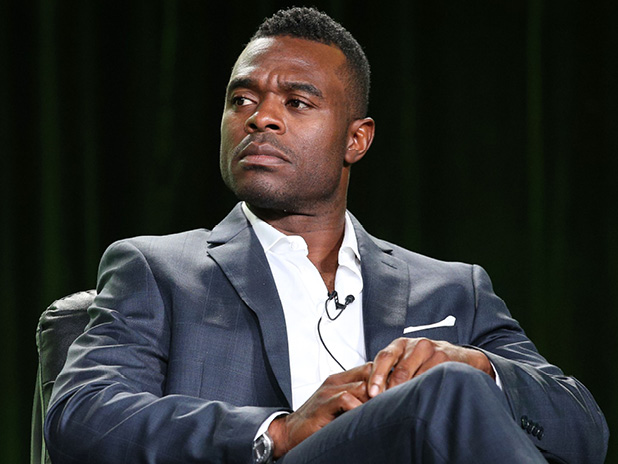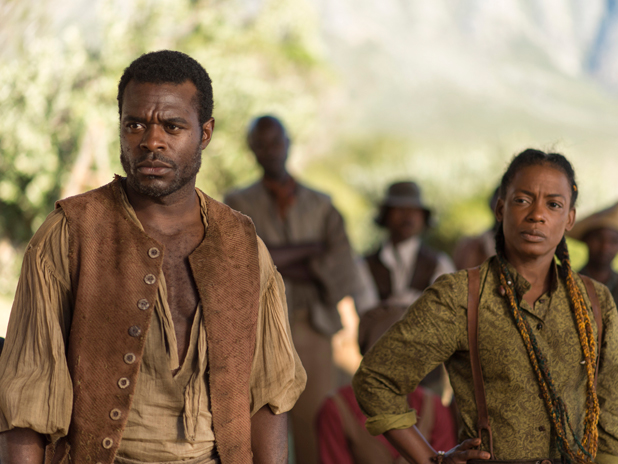A Man Worth Listening To: Lyriq Bent
In getting into the role of Chekura Tyano in the six-part miniseies The Book of Negroes, actor Lyriq Bent went through a lot. A year-long audition process, a massive weight loss and a real look at what people abducted from West Africa and sold into slavery dealt with. Based on Lawrence Hill’s award-winning book of the same name, the story follows the harrowing and, at times, heartbreaking journey of Aminata Diallo (Aunjanue Ellis) who meets, falls in love with and marries Chekura. We spoke with Bent about the miniseries, book-to-movie adaptations and the surprising romantic storyline in the movie.
How did you first get involved?
It was a year-long process. I had heard about it and was just drawn to it. I told my manager I had to be a part of it and he got me an audition. The story and the character really spoke to me. I did the audition and didn’t hear anything for about four months. Five months after, I got a call saying they want to see me again, but that was cancelled. They called again a month later asking to see me again. An hour before that meeting it was canceled, too. One more month later, I got a call to do a reading with a young lady they were considering for the lead role. Instant chemistry. Not too long after that, I was told I got the part. Something I had felt so passionate about had actually happened and it was a wonderful meeting.
Where did you film?
We filmed for four months in South Africa in Capetown. A lot of culture and a lot of history. Mandela had just passed away. It was so interesting to see this country in its transitional state. The crew there was incredible, eager to learn and fast learners. The atmosphere is like San Franscisco; it’s not too hot and never too cold. The shooting was intense, the story is intense. Everyone showed up ready to go. It’s so deep because you’re in Africa shooting a story about people being taken from Africa. We shot almost in sequence. Then we went from South Africa to Nova Scotia…in the winter. It’s cold, desolate and flat. When the wind blows, you feel it. You got a sense of what these people went through when they did the journey. And we had all the cold weather gear, they didn’t. And we weren’t even there in the dead of winter. It was trying but fun.
We got a sense of how it was in Canada. A lot of people think that because you didn’t hear about slavery in Canada, you thought that’s where people went to be free from slavery. Even educated people don’t know about that part of our past. I knew a lot of the history in Nova Scotia, but I also learned a lot working on the project. What it does is make me want to dig deeper to find out more. What I like about this project is that educators want to make this story and this book part of the curriculum.
What kind of mindset do you have before, during and after the filming of a project like this?
The mindset was more that I was excited to be on a project that was so important. Before we started shooting, I was already so deeply in it because they let me have all six scripts. Then I read the book and the likeness between the two was amazing. When you’re reading a story about slavery as a black man, you’re full of negative feelings like bitterness and anger. But when I read this, I was all positive. Every time I reread it, I just always thought, ‘Wow, what a beautiful love story.’ Which is crazy because you would never put the words ‘love story’ with ‘slavery.’ It’s never been in anything I’ve seen or read. I like to say it’s The Notebook meets 12 Years a Slave. It’s all about love. Everything about the character Aminata – and to see this story through the eyes of a woman is amazing – is about her strength and her willpower. It’s about the burning love that Aminata and Churkura had for each other. They want to be together but everything about the system is made to keep them apart. This story shows that it’s okay for a man to love a woman and not be threatened by her strength. I wanted to be a part of a story that depicts that.
Since the beginning of your career, your own journey, how would you say you’ve adapted or changed in order to weather everything that’s come at you?
That’s a good question. Now you have me thinking. When it comes to my career I didn’t walk through the front door. I came around the side door and didn’t let any one know I was there until I was already in the party. I don’t know if I adapted. I kind of think it adapted to me because I don’t recall ever making a change. At all. If anything, I went against the grain. At the screening of The Book of Negroes, my agent said to me, ‘What a long way you’ve come.’ I’ve never stopped and looked at it.
You’ve talked a lot about the romance that’s in The Book of Negroes. How do you think romance has progressed or regressed in modern times?
It’s regressed a lot. Back in the day men were romantic because it was expected. It was about courtship and thinking of ways to express how you felt about a woman. Nowadays, men barely want to say it because it’s not cool. I’m not saying that I’m super romantic, but I’m at least aware of it. It’s so much easier to just buy a woman something rather than think of ways to express your love through other means. People are lazy. But I guess it kind of makes me happy because it makes our story stand out even more. People are going to recognize it as a lost art. Something as simple as showing deep affection in a simple way. For the movie, it’s great; for society, it’s terrible. Hopefully the next generation will figure it out.
What do you think about book-to-movie adaptations?
It’s tough. Book to film is incredibly hard. You have a 500-page book that you want to try to squeeze into 90 minutes. You’re going to lose a lot. If you do extremely well, then the bits that you do keep have to be so tighly connected that it tells a complete story. From beginning to end. And that will only be a fraction of the book. It’s incredibly hard. For example, in 12 Years a Slave, which is a good film, so much was lost because you couldn’t keep everything from the book. It fell a little short while still succeeding as a good movie. The Book of Negroes was originally supposed to be a two-hour film, but producers were convinced that this should be a miniseries, so we were given six hours to tell this story, this journey, this battle and this victory. It was beautifully done.











